Corporations Act Analysis: Business Law Assignment
VerifiedAdded on 2022/09/01
|7
|2717
|46
Homework Assignment
AI Summary
This assignment analyzes a business law case involving Digital10 Pty Ltd and its directors, Brad, Elena, and Jack, under the Corporations Act 2001. The analysis focuses on Brad's actions as managing director, including his failure to disclose conflicts of interest and his misuse of company funds. The assignment examines Brad's potential liabilities concerning duties of care, good faith, and proper use of position and information, referencing specific sections of the Act (180-182, 191, and 344) and relevant case law such as Daniels v. Anderson and Mills v. Mills. The assignment concludes that Brad violated multiple duties, while Elena and Jack were not found liable. The case highlights the importance of director responsibilities in maintaining financial statements, disclosing conflicts, and acting in the best interests of the company, as well as the consequences of failing to do so.
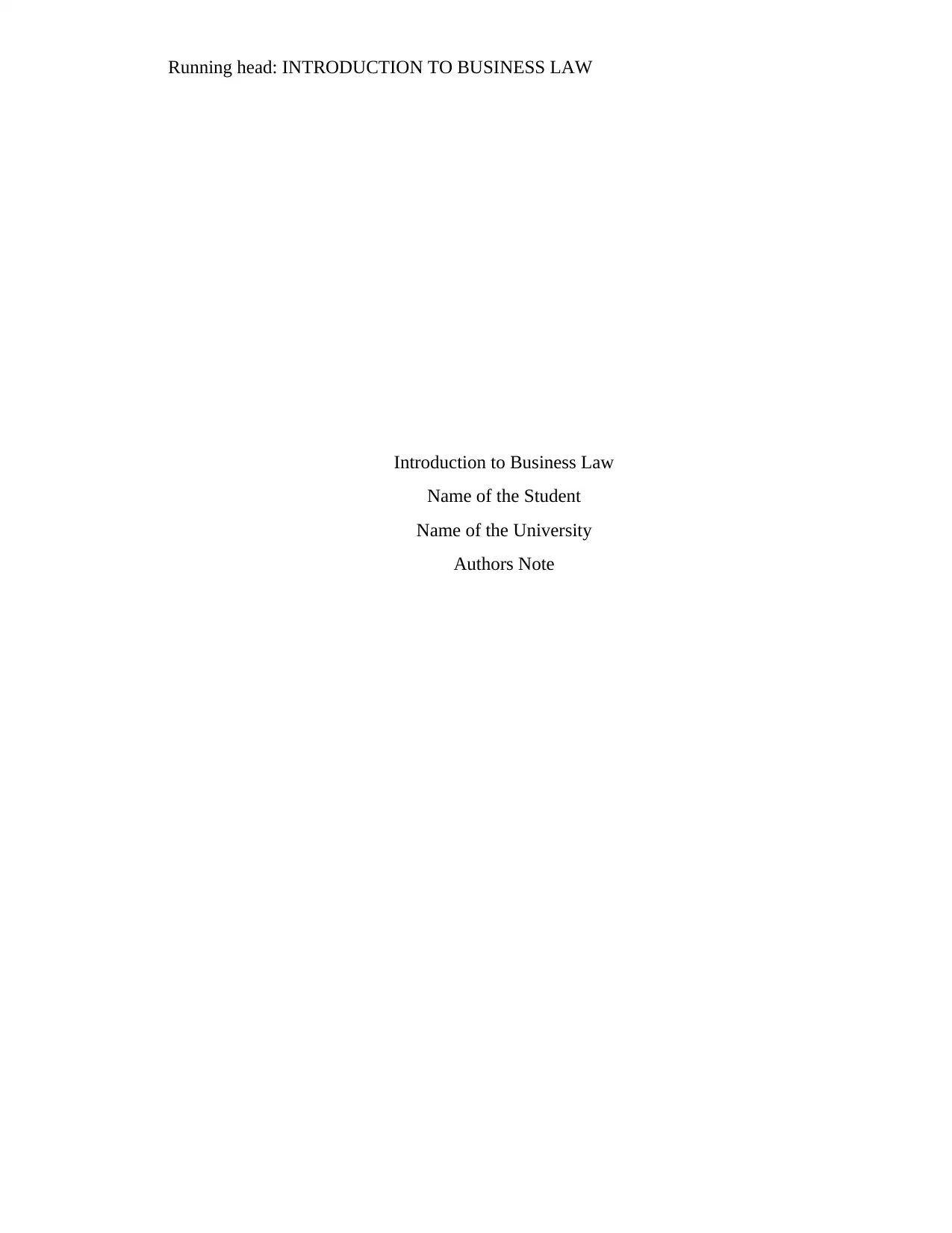
Running head: INTRODUCTION TO BUSINESS LAW
Introduction to Business Law
Name of the Student
Name of the University
Authors Note
Introduction to Business Law
Name of the Student
Name of the University
Authors Note
Paraphrase This Document
Need a fresh take? Get an instant paraphrase of this document with our AI Paraphraser
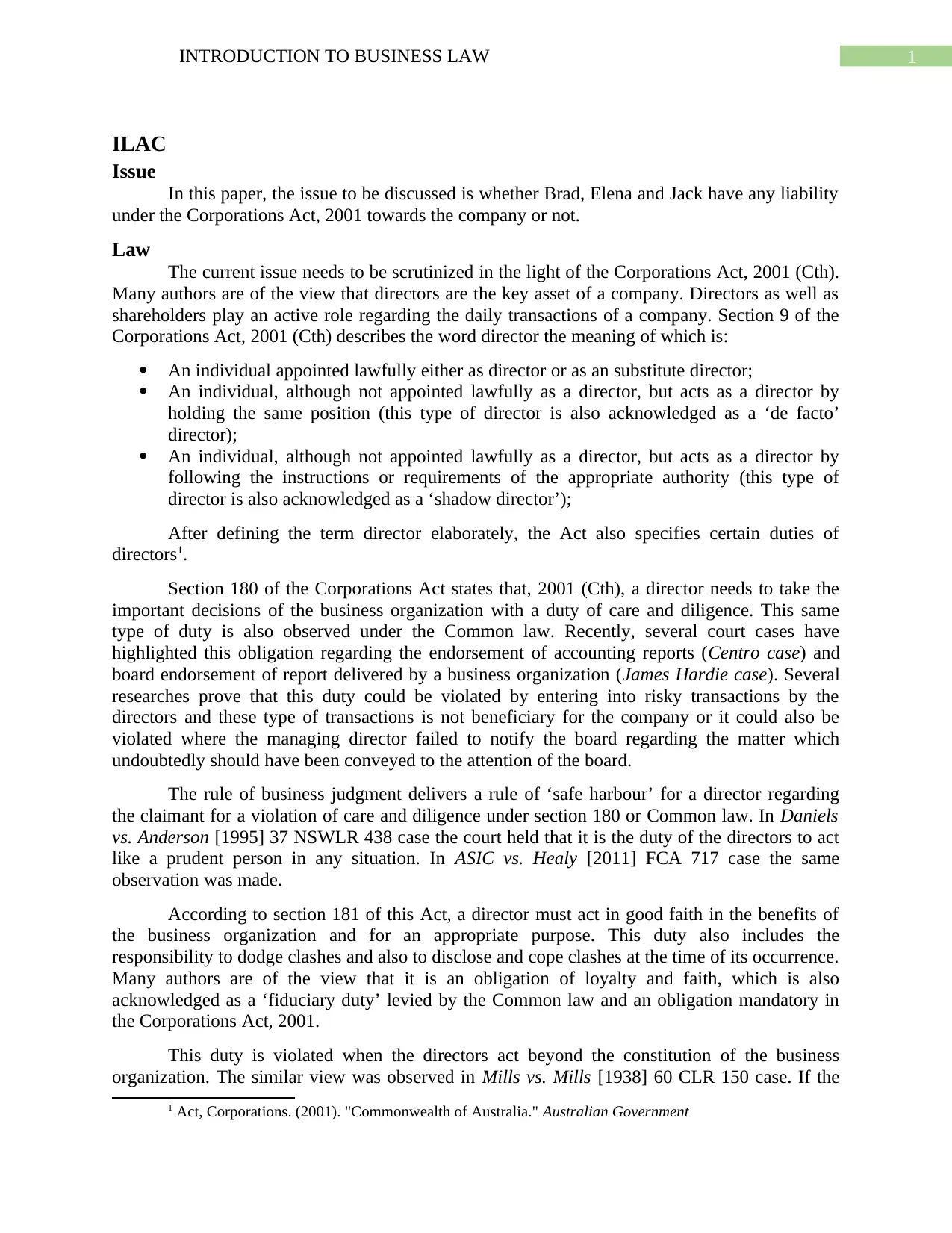
1INTRODUCTION TO BUSINESS LAW
ILAC
Issue
In this paper, the issue to be discussed is whether Brad, Elena and Jack have any liability
under the Corporations Act, 2001 towards the company or not.
Law
The current issue needs to be scrutinized in the light of the Corporations Act, 2001 (Cth).
Many authors are of the view that directors are the key asset of a company. Directors as well as
shareholders play an active role regarding the daily transactions of a company. Section 9 of the
Corporations Act, 2001 (Cth) describes the word director the meaning of which is:
An individual appointed lawfully either as director or as an substitute director;
An individual, although not appointed lawfully as a director, but acts as a director by
holding the same position (this type of director is also acknowledged as a ‘de facto’
director);
An individual, although not appointed lawfully as a director, but acts as a director by
following the instructions or requirements of the appropriate authority (this type of
director is also acknowledged as a ‘shadow director’);
After defining the term director elaborately, the Act also specifies certain duties of
directors1.
Section 180 of the Corporations Act states that, 2001 (Cth), a director needs to take the
important decisions of the business organization with a duty of care and diligence. This same
type of duty is also observed under the Common law. Recently, several court cases have
highlighted this obligation regarding the endorsement of accounting reports (Centro case) and
board endorsement of report delivered by a business organization (James Hardie case). Several
researches prove that this duty could be violated by entering into risky transactions by the
directors and these type of transactions is not beneficiary for the company or it could also be
violated where the managing director failed to notify the board regarding the matter which
undoubtedly should have been conveyed to the attention of the board.
The rule of business judgment delivers a rule of ‘safe harbour’ for a director regarding
the claimant for a violation of care and diligence under section 180 or Common law. In Daniels
vs. Anderson [1995] 37 NSWLR 438 case the court held that it is the duty of the directors to act
like a prudent person in any situation. In ASIC vs. Healy [2011] FCA 717 case the same
observation was made.
According to section 181 of this Act, a director must act in good faith in the benefits of
the business organization and for an appropriate purpose. This duty also includes the
responsibility to dodge clashes and also to disclose and cope clashes at the time of its occurrence.
Many authors are of the view that it is an obligation of loyalty and faith, which is also
acknowledged as a ‘fiduciary duty’ levied by the Common law and an obligation mandatory in
the Corporations Act, 2001.
This duty is violated when the directors act beyond the constitution of the business
organization. The similar view was observed in Mills vs. Mills [1938] 60 CLR 150 case. If the
1 Act, Corporations. (2001). "Commonwealth of Australia." Australian Government
ILAC
Issue
In this paper, the issue to be discussed is whether Brad, Elena and Jack have any liability
under the Corporations Act, 2001 towards the company or not.
Law
The current issue needs to be scrutinized in the light of the Corporations Act, 2001 (Cth).
Many authors are of the view that directors are the key asset of a company. Directors as well as
shareholders play an active role regarding the daily transactions of a company. Section 9 of the
Corporations Act, 2001 (Cth) describes the word director the meaning of which is:
An individual appointed lawfully either as director or as an substitute director;
An individual, although not appointed lawfully as a director, but acts as a director by
holding the same position (this type of director is also acknowledged as a ‘de facto’
director);
An individual, although not appointed lawfully as a director, but acts as a director by
following the instructions or requirements of the appropriate authority (this type of
director is also acknowledged as a ‘shadow director’);
After defining the term director elaborately, the Act also specifies certain duties of
directors1.
Section 180 of the Corporations Act states that, 2001 (Cth), a director needs to take the
important decisions of the business organization with a duty of care and diligence. This same
type of duty is also observed under the Common law. Recently, several court cases have
highlighted this obligation regarding the endorsement of accounting reports (Centro case) and
board endorsement of report delivered by a business organization (James Hardie case). Several
researches prove that this duty could be violated by entering into risky transactions by the
directors and these type of transactions is not beneficiary for the company or it could also be
violated where the managing director failed to notify the board regarding the matter which
undoubtedly should have been conveyed to the attention of the board.
The rule of business judgment delivers a rule of ‘safe harbour’ for a director regarding
the claimant for a violation of care and diligence under section 180 or Common law. In Daniels
vs. Anderson [1995] 37 NSWLR 438 case the court held that it is the duty of the directors to act
like a prudent person in any situation. In ASIC vs. Healy [2011] FCA 717 case the same
observation was made.
According to section 181 of this Act, a director must act in good faith in the benefits of
the business organization and for an appropriate purpose. This duty also includes the
responsibility to dodge clashes and also to disclose and cope clashes at the time of its occurrence.
Many authors are of the view that it is an obligation of loyalty and faith, which is also
acknowledged as a ‘fiduciary duty’ levied by the Common law and an obligation mandatory in
the Corporations Act, 2001.
This duty is violated when the directors act beyond the constitution of the business
organization. The similar view was observed in Mills vs. Mills [1938] 60 CLR 150 case. If the
1 Act, Corporations. (2001). "Commonwealth of Australia." Australian Government
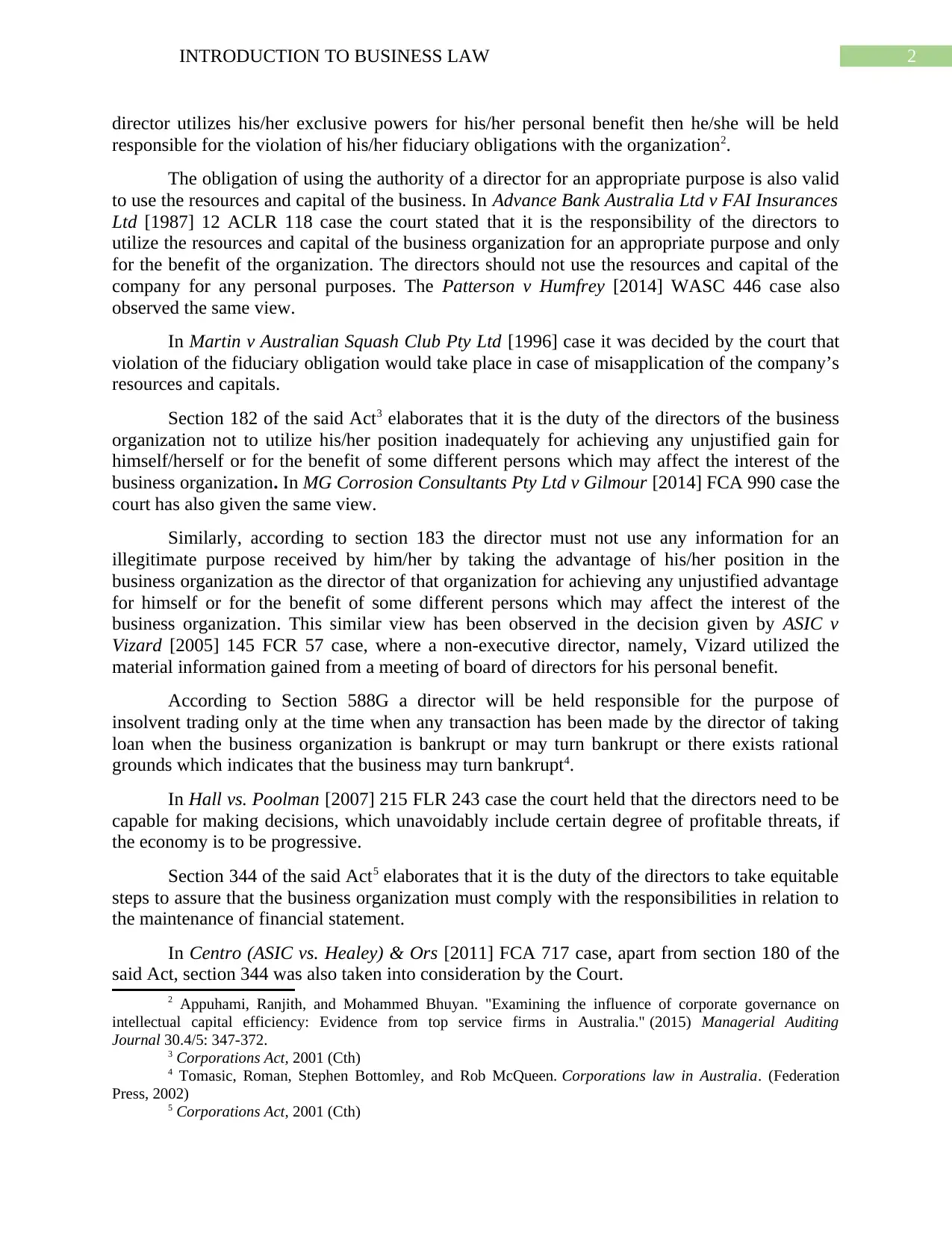
2INTRODUCTION TO BUSINESS LAW
director utilizes his/her exclusive powers for his/her personal benefit then he/she will be held
responsible for the violation of his/her fiduciary obligations with the organization2.
The obligation of using the authority of a director for an appropriate purpose is also valid
to use the resources and capital of the business. In Advance Bank Australia Ltd v FAI Insurances
Ltd [1987] 12 ACLR 118 case the court stated that it is the responsibility of the directors to
utilize the resources and capital of the business organization for an appropriate purpose and only
for the benefit of the organization. The directors should not use the resources and capital of the
company for any personal purposes. The Patterson v Humfrey [2014] WASC 446 case also
observed the same view.
In Martin v Australian Squash Club Pty Ltd [1996] case it was decided by the court that
violation of the fiduciary obligation would take place in case of misapplication of the company’s
resources and capitals.
Section 182 of the said Act3 elaborates that it is the duty of the directors of the business
organization not to utilize his/her position inadequately for achieving any unjustified gain for
himself/herself or for the benefit of some different persons which may affect the interest of the
business organization. In MG Corrosion Consultants Pty Ltd v Gilmour [2014] FCA 990 case the
court has also given the same view.
Similarly, according to section 183 the director must not use any information for an
illegitimate purpose received by him/her by taking the advantage of his/her position in the
business organization as the director of that organization for achieving any unjustified advantage
for himself or for the benefit of some different persons which may affect the interest of the
business organization. This similar view has been observed in the decision given by ASIC v
Vizard [2005] 145 FCR 57 case, where a non-executive director, namely, Vizard utilized the
material information gained from a meeting of board of directors for his personal benefit.
According to Section 588G a director will be held responsible for the purpose of
insolvent trading only at the time when any transaction has been made by the director of taking
loan when the business organization is bankrupt or may turn bankrupt or there exists rational
grounds which indicates that the business may turn bankrupt4.
In Hall vs. Poolman [2007] 215 FLR 243 case the court held that the directors need to be
capable for making decisions, which unavoidably include certain degree of profitable threats, if
the economy is to be progressive.
Section 344 of the said Act5 elaborates that it is the duty of the directors to take equitable
steps to assure that the business organization must comply with the responsibilities in relation to
the maintenance of financial statement.
In Centro (ASIC vs. Healey) & Ors [2011] FCA 717 case, apart from section 180 of the
said Act, section 344 was also taken into consideration by the Court.
2 Appuhami, Ranjith, and Mohammed Bhuyan. "Examining the influence of corporate governance on
intellectual capital efficiency: Evidence from top service firms in Australia." (2015) Managerial Auditing
Journal 30.4/5: 347-372.
3 Corporations Act, 2001 (Cth)
4 Tomasic, Roman, Stephen Bottomley, and Rob McQueen. Corporations law in Australia. (Federation
Press, 2002)
5 Corporations Act, 2001 (Cth)
director utilizes his/her exclusive powers for his/her personal benefit then he/she will be held
responsible for the violation of his/her fiduciary obligations with the organization2.
The obligation of using the authority of a director for an appropriate purpose is also valid
to use the resources and capital of the business. In Advance Bank Australia Ltd v FAI Insurances
Ltd [1987] 12 ACLR 118 case the court stated that it is the responsibility of the directors to
utilize the resources and capital of the business organization for an appropriate purpose and only
for the benefit of the organization. The directors should not use the resources and capital of the
company for any personal purposes. The Patterson v Humfrey [2014] WASC 446 case also
observed the same view.
In Martin v Australian Squash Club Pty Ltd [1996] case it was decided by the court that
violation of the fiduciary obligation would take place in case of misapplication of the company’s
resources and capitals.
Section 182 of the said Act3 elaborates that it is the duty of the directors of the business
organization not to utilize his/her position inadequately for achieving any unjustified gain for
himself/herself or for the benefit of some different persons which may affect the interest of the
business organization. In MG Corrosion Consultants Pty Ltd v Gilmour [2014] FCA 990 case the
court has also given the same view.
Similarly, according to section 183 the director must not use any information for an
illegitimate purpose received by him/her by taking the advantage of his/her position in the
business organization as the director of that organization for achieving any unjustified advantage
for himself or for the benefit of some different persons which may affect the interest of the
business organization. This similar view has been observed in the decision given by ASIC v
Vizard [2005] 145 FCR 57 case, where a non-executive director, namely, Vizard utilized the
material information gained from a meeting of board of directors for his personal benefit.
According to Section 588G a director will be held responsible for the purpose of
insolvent trading only at the time when any transaction has been made by the director of taking
loan when the business organization is bankrupt or may turn bankrupt or there exists rational
grounds which indicates that the business may turn bankrupt4.
In Hall vs. Poolman [2007] 215 FLR 243 case the court held that the directors need to be
capable for making decisions, which unavoidably include certain degree of profitable threats, if
the economy is to be progressive.
Section 344 of the said Act5 elaborates that it is the duty of the directors to take equitable
steps to assure that the business organization must comply with the responsibilities in relation to
the maintenance of financial statement.
In Centro (ASIC vs. Healey) & Ors [2011] FCA 717 case, apart from section 180 of the
said Act, section 344 was also taken into consideration by the Court.
2 Appuhami, Ranjith, and Mohammed Bhuyan. "Examining the influence of corporate governance on
intellectual capital efficiency: Evidence from top service firms in Australia." (2015) Managerial Auditing
Journal 30.4/5: 347-372.
3 Corporations Act, 2001 (Cth)
4 Tomasic, Roman, Stephen Bottomley, and Rob McQueen. Corporations law in Australia. (Federation
Press, 2002)
5 Corporations Act, 2001 (Cth)
⊘ This is a preview!⊘
Do you want full access?
Subscribe today to unlock all pages.

Trusted by 1+ million students worldwide
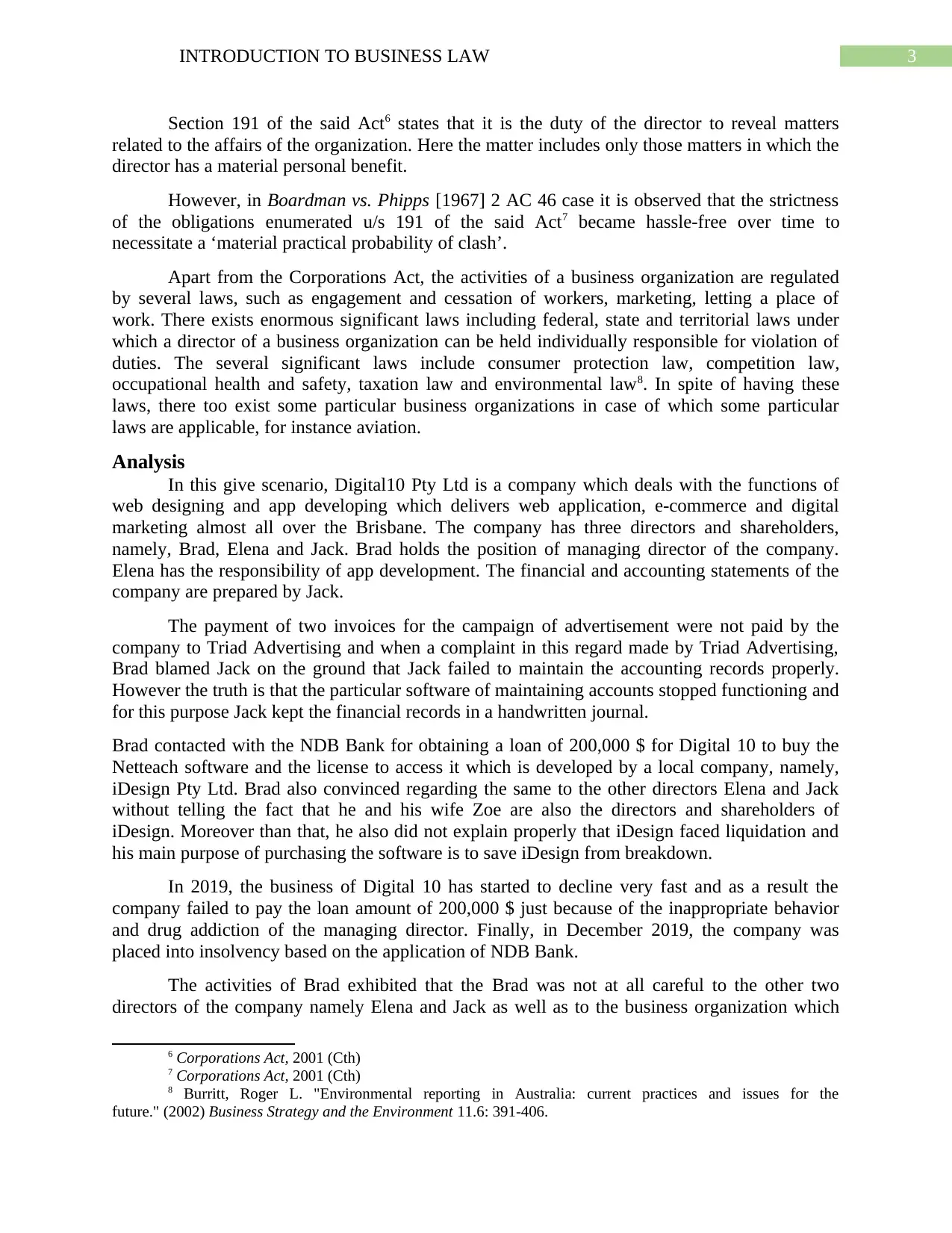
3INTRODUCTION TO BUSINESS LAW
Section 191 of the said Act6 states that it is the duty of the director to reveal matters
related to the affairs of the organization. Here the matter includes only those matters in which the
director has a material personal benefit.
However, in Boardman vs. Phipps [1967] 2 AC 46 case it is observed that the strictness
of the obligations enumerated u/s 191 of the said Act7 became hassle-free over time to
necessitate a ‘material practical probability of clash’.
Apart from the Corporations Act, the activities of a business organization are regulated
by several laws, such as engagement and cessation of workers, marketing, letting a place of
work. There exists enormous significant laws including federal, state and territorial laws under
which a director of a business organization can be held individually responsible for violation of
duties. The several significant laws include consumer protection law, competition law,
occupational health and safety, taxation law and environmental law8. In spite of having these
laws, there too exist some particular business organizations in case of which some particular
laws are applicable, for instance aviation.
Analysis
In this give scenario, Digital10 Pty Ltd is a company which deals with the functions of
web designing and app developing which delivers web application, e-commerce and digital
marketing almost all over the Brisbane. The company has three directors and shareholders,
namely, Brad, Elena and Jack. Brad holds the position of managing director of the company.
Elena has the responsibility of app development. The financial and accounting statements of the
company are prepared by Jack.
The payment of two invoices for the campaign of advertisement were not paid by the
company to Triad Advertising and when a complaint in this regard made by Triad Advertising,
Brad blamed Jack on the ground that Jack failed to maintain the accounting records properly.
However the truth is that the particular software of maintaining accounts stopped functioning and
for this purpose Jack kept the financial records in a handwritten journal.
Brad contacted with the NDB Bank for obtaining a loan of 200,000 $ for Digital 10 to buy the
Netteach software and the license to access it which is developed by a local company, namely,
iDesign Pty Ltd. Brad also convinced regarding the same to the other directors Elena and Jack
without telling the fact that he and his wife Zoe are also the directors and shareholders of
iDesign. Moreover than that, he also did not explain properly that iDesign faced liquidation and
his main purpose of purchasing the software is to save iDesign from breakdown.
In 2019, the business of Digital 10 has started to decline very fast and as a result the
company failed to pay the loan amount of 200,000 $ just because of the inappropriate behavior
and drug addiction of the managing director. Finally, in December 2019, the company was
placed into insolvency based on the application of NDB Bank.
The activities of Brad exhibited that the Brad was not at all careful to the other two
directors of the company namely Elena and Jack as well as to the business organization which
6 Corporations Act, 2001 (Cth)
7 Corporations Act, 2001 (Cth)
8 Burritt, Roger L. "Environmental reporting in Australia: current practices and issues for the
future." (2002) Business Strategy and the Environment 11.6: 391-406.
Section 191 of the said Act6 states that it is the duty of the director to reveal matters
related to the affairs of the organization. Here the matter includes only those matters in which the
director has a material personal benefit.
However, in Boardman vs. Phipps [1967] 2 AC 46 case it is observed that the strictness
of the obligations enumerated u/s 191 of the said Act7 became hassle-free over time to
necessitate a ‘material practical probability of clash’.
Apart from the Corporations Act, the activities of a business organization are regulated
by several laws, such as engagement and cessation of workers, marketing, letting a place of
work. There exists enormous significant laws including federal, state and territorial laws under
which a director of a business organization can be held individually responsible for violation of
duties. The several significant laws include consumer protection law, competition law,
occupational health and safety, taxation law and environmental law8. In spite of having these
laws, there too exist some particular business organizations in case of which some particular
laws are applicable, for instance aviation.
Analysis
In this give scenario, Digital10 Pty Ltd is a company which deals with the functions of
web designing and app developing which delivers web application, e-commerce and digital
marketing almost all over the Brisbane. The company has three directors and shareholders,
namely, Brad, Elena and Jack. Brad holds the position of managing director of the company.
Elena has the responsibility of app development. The financial and accounting statements of the
company are prepared by Jack.
The payment of two invoices for the campaign of advertisement were not paid by the
company to Triad Advertising and when a complaint in this regard made by Triad Advertising,
Brad blamed Jack on the ground that Jack failed to maintain the accounting records properly.
However the truth is that the particular software of maintaining accounts stopped functioning and
for this purpose Jack kept the financial records in a handwritten journal.
Brad contacted with the NDB Bank for obtaining a loan of 200,000 $ for Digital 10 to buy the
Netteach software and the license to access it which is developed by a local company, namely,
iDesign Pty Ltd. Brad also convinced regarding the same to the other directors Elena and Jack
without telling the fact that he and his wife Zoe are also the directors and shareholders of
iDesign. Moreover than that, he also did not explain properly that iDesign faced liquidation and
his main purpose of purchasing the software is to save iDesign from breakdown.
In 2019, the business of Digital 10 has started to decline very fast and as a result the
company failed to pay the loan amount of 200,000 $ just because of the inappropriate behavior
and drug addiction of the managing director. Finally, in December 2019, the company was
placed into insolvency based on the application of NDB Bank.
The activities of Brad exhibited that the Brad was not at all careful to the other two
directors of the company namely Elena and Jack as well as to the business organization which
6 Corporations Act, 2001 (Cth)
7 Corporations Act, 2001 (Cth)
8 Burritt, Roger L. "Environmental reporting in Australia: current practices and issues for the
future." (2002) Business Strategy and the Environment 11.6: 391-406.
Paraphrase This Document
Need a fresh take? Get an instant paraphrase of this document with our AI Paraphraser
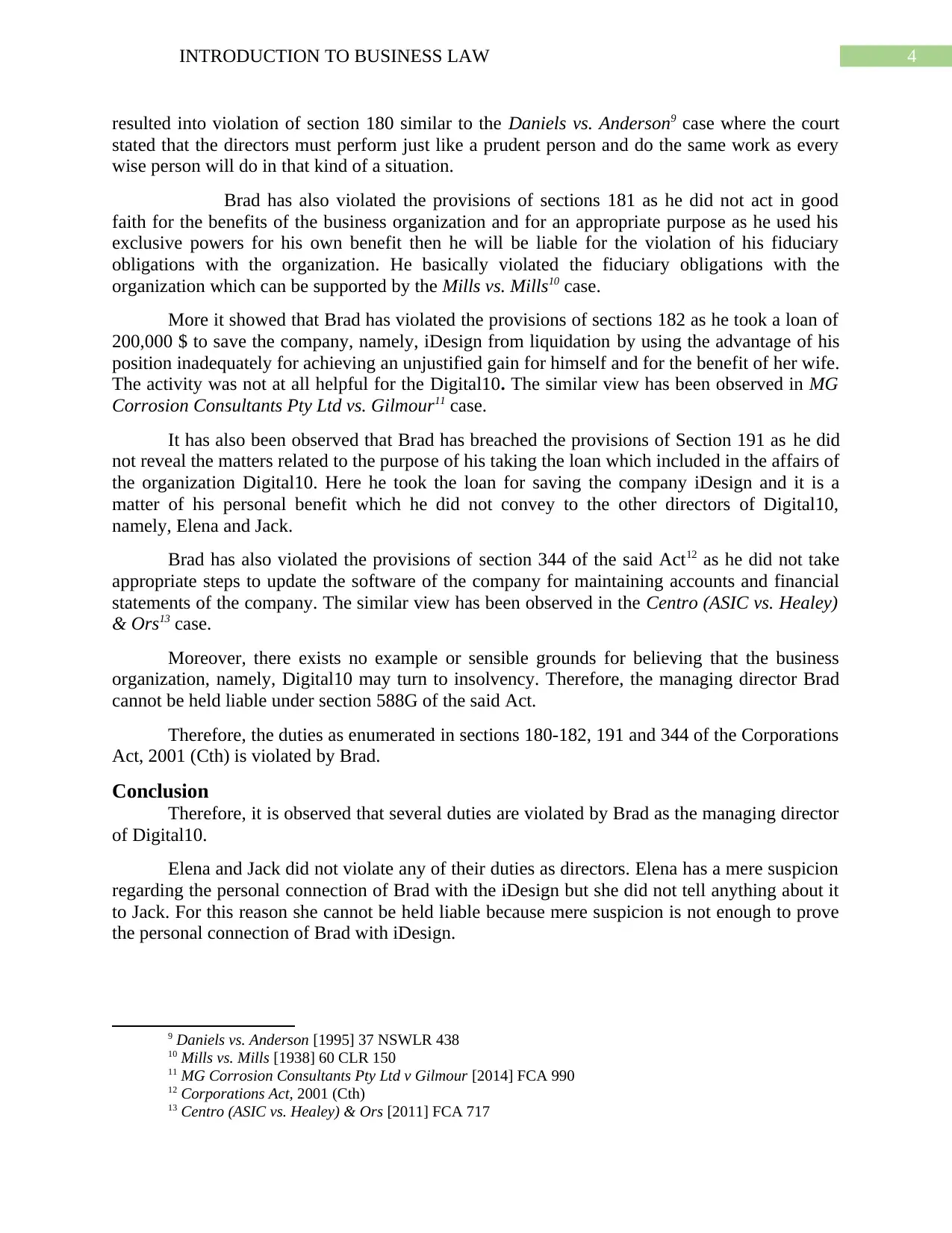
4INTRODUCTION TO BUSINESS LAW
resulted into violation of section 180 similar to the Daniels vs. Anderson9 case where the court
stated that the directors must perform just like a prudent person and do the same work as every
wise person will do in that kind of a situation.
Brad has also violated the provisions of sections 181 as he did not act in good
faith for the benefits of the business organization and for an appropriate purpose as he used his
exclusive powers for his own benefit then he will be liable for the violation of his fiduciary
obligations with the organization. He basically violated the fiduciary obligations with the
organization which can be supported by the Mills vs. Mills10 case.
More it showed that Brad has violated the provisions of sections 182 as he took a loan of
200,000 $ to save the company, namely, iDesign from liquidation by using the advantage of his
position inadequately for achieving an unjustified gain for himself and for the benefit of her wife.
The activity was not at all helpful for the Digital10. The similar view has been observed in MG
Corrosion Consultants Pty Ltd vs. Gilmour11 case.
It has also been observed that Brad has breached the provisions of Section 191 as he did
not reveal the matters related to the purpose of his taking the loan which included in the affairs of
the organization Digital10. Here he took the loan for saving the company iDesign and it is a
matter of his personal benefit which he did not convey to the other directors of Digital10,
namely, Elena and Jack.
Brad has also violated the provisions of section 344 of the said Act12 as he did not take
appropriate steps to update the software of the company for maintaining accounts and financial
statements of the company. The similar view has been observed in the Centro (ASIC vs. Healey)
& Ors13 case.
Moreover, there exists no example or sensible grounds for believing that the business
organization, namely, Digital10 may turn to insolvency. Therefore, the managing director Brad
cannot be held liable under section 588G of the said Act.
Therefore, the duties as enumerated in sections 180-182, 191 and 344 of the Corporations
Act, 2001 (Cth) is violated by Brad.
Conclusion
Therefore, it is observed that several duties are violated by Brad as the managing director
of Digital10.
Elena and Jack did not violate any of their duties as directors. Elena has a mere suspicion
regarding the personal connection of Brad with the iDesign but she did not tell anything about it
to Jack. For this reason she cannot be held liable because mere suspicion is not enough to prove
the personal connection of Brad with iDesign.
9 Daniels vs. Anderson [1995] 37 NSWLR 438
10 Mills vs. Mills [1938] 60 CLR 150
11 MG Corrosion Consultants Pty Ltd v Gilmour [2014] FCA 990
12 Corporations Act, 2001 (Cth)
13 Centro (ASIC vs. Healey) & Ors [2011] FCA 717
resulted into violation of section 180 similar to the Daniels vs. Anderson9 case where the court
stated that the directors must perform just like a prudent person and do the same work as every
wise person will do in that kind of a situation.
Brad has also violated the provisions of sections 181 as he did not act in good
faith for the benefits of the business organization and for an appropriate purpose as he used his
exclusive powers for his own benefit then he will be liable for the violation of his fiduciary
obligations with the organization. He basically violated the fiduciary obligations with the
organization which can be supported by the Mills vs. Mills10 case.
More it showed that Brad has violated the provisions of sections 182 as he took a loan of
200,000 $ to save the company, namely, iDesign from liquidation by using the advantage of his
position inadequately for achieving an unjustified gain for himself and for the benefit of her wife.
The activity was not at all helpful for the Digital10. The similar view has been observed in MG
Corrosion Consultants Pty Ltd vs. Gilmour11 case.
It has also been observed that Brad has breached the provisions of Section 191 as he did
not reveal the matters related to the purpose of his taking the loan which included in the affairs of
the organization Digital10. Here he took the loan for saving the company iDesign and it is a
matter of his personal benefit which he did not convey to the other directors of Digital10,
namely, Elena and Jack.
Brad has also violated the provisions of section 344 of the said Act12 as he did not take
appropriate steps to update the software of the company for maintaining accounts and financial
statements of the company. The similar view has been observed in the Centro (ASIC vs. Healey)
& Ors13 case.
Moreover, there exists no example or sensible grounds for believing that the business
organization, namely, Digital10 may turn to insolvency. Therefore, the managing director Brad
cannot be held liable under section 588G of the said Act.
Therefore, the duties as enumerated in sections 180-182, 191 and 344 of the Corporations
Act, 2001 (Cth) is violated by Brad.
Conclusion
Therefore, it is observed that several duties are violated by Brad as the managing director
of Digital10.
Elena and Jack did not violate any of their duties as directors. Elena has a mere suspicion
regarding the personal connection of Brad with the iDesign but she did not tell anything about it
to Jack. For this reason she cannot be held liable because mere suspicion is not enough to prove
the personal connection of Brad with iDesign.
9 Daniels vs. Anderson [1995] 37 NSWLR 438
10 Mills vs. Mills [1938] 60 CLR 150
11 MG Corrosion Consultants Pty Ltd v Gilmour [2014] FCA 990
12 Corporations Act, 2001 (Cth)
13 Centro (ASIC vs. Healey) & Ors [2011] FCA 717
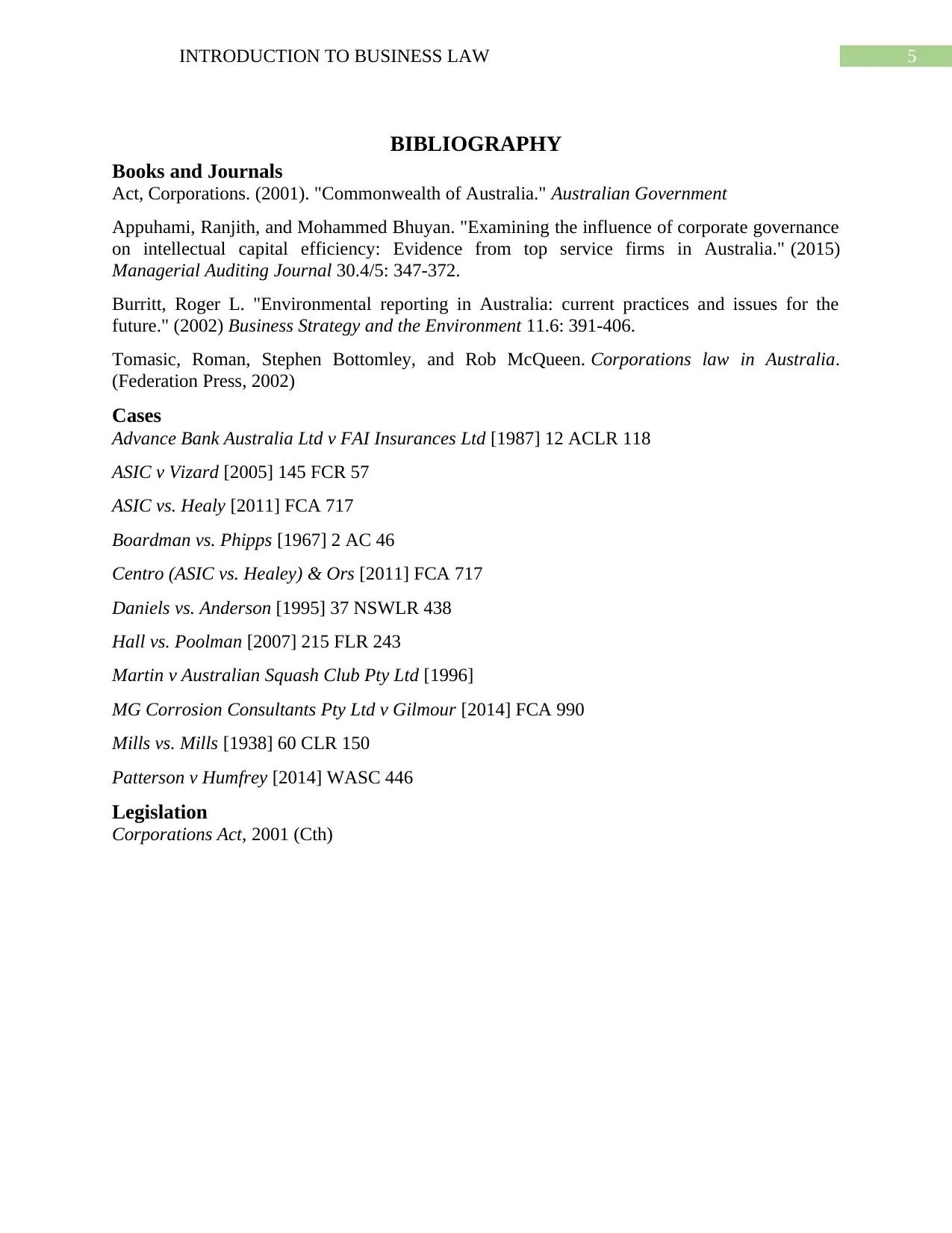
5INTRODUCTION TO BUSINESS LAW
BIBLIOGRAPHY
Books and Journals
Act, Corporations. (2001). "Commonwealth of Australia." Australian Government
Appuhami, Ranjith, and Mohammed Bhuyan. "Examining the influence of corporate governance
on intellectual capital efficiency: Evidence from top service firms in Australia." (2015)
Managerial Auditing Journal 30.4/5: 347-372.
Burritt, Roger L. "Environmental reporting in Australia: current practices and issues for the
future." (2002) Business Strategy and the Environment 11.6: 391-406.
Tomasic, Roman, Stephen Bottomley, and Rob McQueen. Corporations law in Australia.
(Federation Press, 2002)
Cases
Advance Bank Australia Ltd v FAI Insurances Ltd [1987] 12 ACLR 118
ASIC v Vizard [2005] 145 FCR 57
ASIC vs. Healy [2011] FCA 717
Boardman vs. Phipps [1967] 2 AC 46
Centro (ASIC vs. Healey) & Ors [2011] FCA 717
Daniels vs. Anderson [1995] 37 NSWLR 438
Hall vs. Poolman [2007] 215 FLR 243
Martin v Australian Squash Club Pty Ltd [1996]
MG Corrosion Consultants Pty Ltd v Gilmour [2014] FCA 990
Mills vs. Mills [1938] 60 CLR 150
Patterson v Humfrey [2014] WASC 446
Legislation
Corporations Act, 2001 (Cth)
BIBLIOGRAPHY
Books and Journals
Act, Corporations. (2001). "Commonwealth of Australia." Australian Government
Appuhami, Ranjith, and Mohammed Bhuyan. "Examining the influence of corporate governance
on intellectual capital efficiency: Evidence from top service firms in Australia." (2015)
Managerial Auditing Journal 30.4/5: 347-372.
Burritt, Roger L. "Environmental reporting in Australia: current practices and issues for the
future." (2002) Business Strategy and the Environment 11.6: 391-406.
Tomasic, Roman, Stephen Bottomley, and Rob McQueen. Corporations law in Australia.
(Federation Press, 2002)
Cases
Advance Bank Australia Ltd v FAI Insurances Ltd [1987] 12 ACLR 118
ASIC v Vizard [2005] 145 FCR 57
ASIC vs. Healy [2011] FCA 717
Boardman vs. Phipps [1967] 2 AC 46
Centro (ASIC vs. Healey) & Ors [2011] FCA 717
Daniels vs. Anderson [1995] 37 NSWLR 438
Hall vs. Poolman [2007] 215 FLR 243
Martin v Australian Squash Club Pty Ltd [1996]
MG Corrosion Consultants Pty Ltd v Gilmour [2014] FCA 990
Mills vs. Mills [1938] 60 CLR 150
Patterson v Humfrey [2014] WASC 446
Legislation
Corporations Act, 2001 (Cth)
⊘ This is a preview!⊘
Do you want full access?
Subscribe today to unlock all pages.

Trusted by 1+ million students worldwide
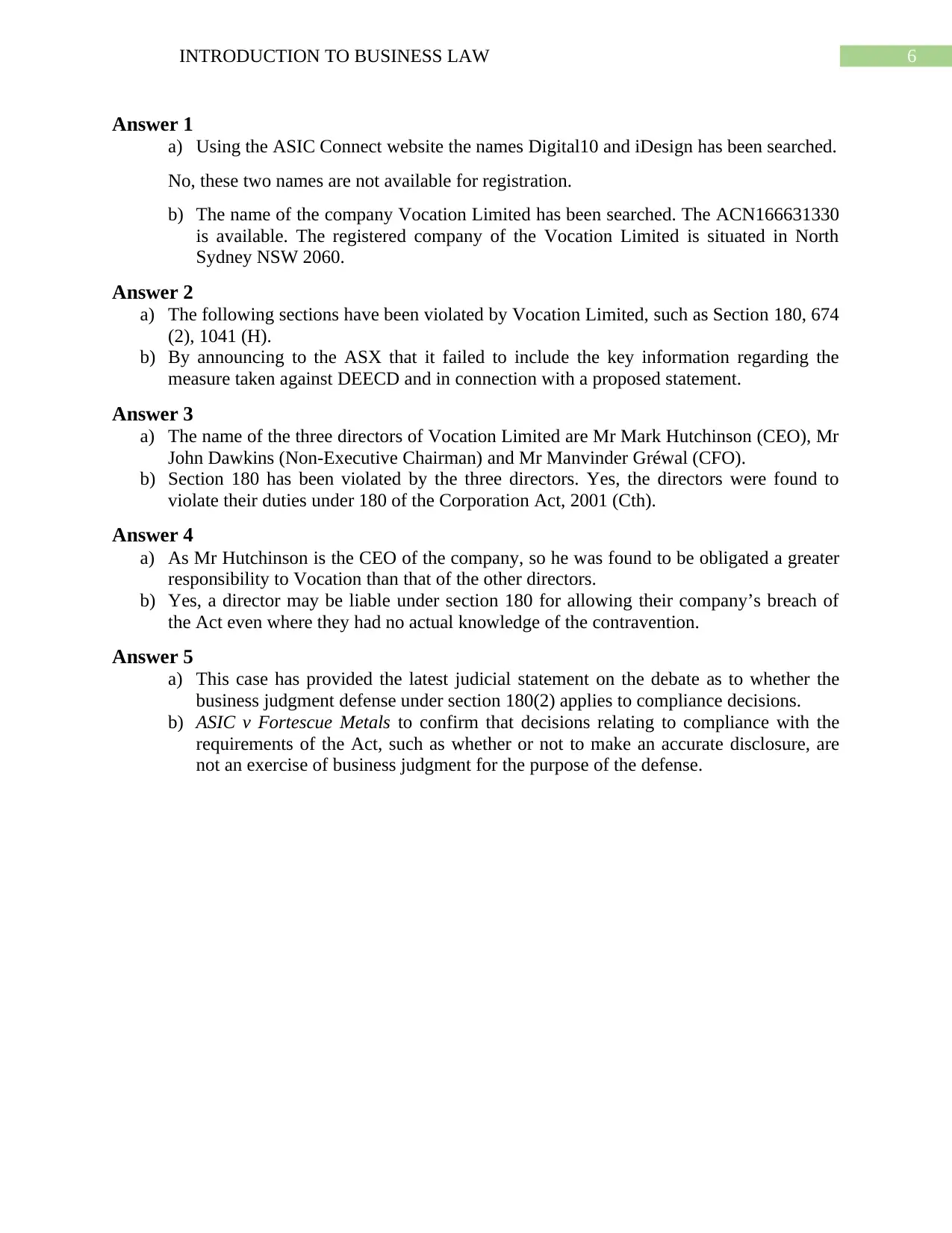
6INTRODUCTION TO BUSINESS LAW
Answer 1
a) Using the ASIC Connect website the names Digital10 and iDesign has been searched.
No, these two names are not available for registration.
b) The name of the company Vocation Limited has been searched. The ACN166631330
is available. The registered company of the Vocation Limited is situated in North
Sydney NSW 2060.
Answer 2
a) The following sections have been violated by Vocation Limited, such as Section 180, 674
(2), 1041 (H).
b) By announcing to the ASX that it failed to include the key information regarding the
measure taken against DEECD and in connection with a proposed statement.
Answer 3
a) The name of the three directors of Vocation Limited are Mr Mark Hutchinson (CEO), Mr
John Dawkins (Non-Executive Chairman) and Mr Manvinder Gréwal (CFO).
b) Section 180 has been violated by the three directors. Yes, the directors were found to
violate their duties under 180 of the Corporation Act, 2001 (Cth).
Answer 4
a) As Mr Hutchinson is the CEO of the company, so he was found to be obligated a greater
responsibility to Vocation than that of the other directors.
b) Yes, a director may be liable under section 180 for allowing their company’s breach of
the Act even where they had no actual knowledge of the contravention.
Answer 5
a) This case has provided the latest judicial statement on the debate as to whether the
business judgment defense under section 180(2) applies to compliance decisions.
b) ASIC v Fortescue Metals to confirm that decisions relating to compliance with the
requirements of the Act, such as whether or not to make an accurate disclosure, are
not an exercise of business judgment for the purpose of the defense.
Answer 1
a) Using the ASIC Connect website the names Digital10 and iDesign has been searched.
No, these two names are not available for registration.
b) The name of the company Vocation Limited has been searched. The ACN166631330
is available. The registered company of the Vocation Limited is situated in North
Sydney NSW 2060.
Answer 2
a) The following sections have been violated by Vocation Limited, such as Section 180, 674
(2), 1041 (H).
b) By announcing to the ASX that it failed to include the key information regarding the
measure taken against DEECD and in connection with a proposed statement.
Answer 3
a) The name of the three directors of Vocation Limited are Mr Mark Hutchinson (CEO), Mr
John Dawkins (Non-Executive Chairman) and Mr Manvinder Gréwal (CFO).
b) Section 180 has been violated by the three directors. Yes, the directors were found to
violate their duties under 180 of the Corporation Act, 2001 (Cth).
Answer 4
a) As Mr Hutchinson is the CEO of the company, so he was found to be obligated a greater
responsibility to Vocation than that of the other directors.
b) Yes, a director may be liable under section 180 for allowing their company’s breach of
the Act even where they had no actual knowledge of the contravention.
Answer 5
a) This case has provided the latest judicial statement on the debate as to whether the
business judgment defense under section 180(2) applies to compliance decisions.
b) ASIC v Fortescue Metals to confirm that decisions relating to compliance with the
requirements of the Act, such as whether or not to make an accurate disclosure, are
not an exercise of business judgment for the purpose of the defense.
1 out of 7
Related Documents
Your All-in-One AI-Powered Toolkit for Academic Success.
+13062052269
info@desklib.com
Available 24*7 on WhatsApp / Email
![[object Object]](/_next/static/media/star-bottom.7253800d.svg)
Unlock your academic potential
Copyright © 2020–2025 A2Z Services. All Rights Reserved. Developed and managed by ZUCOL.




